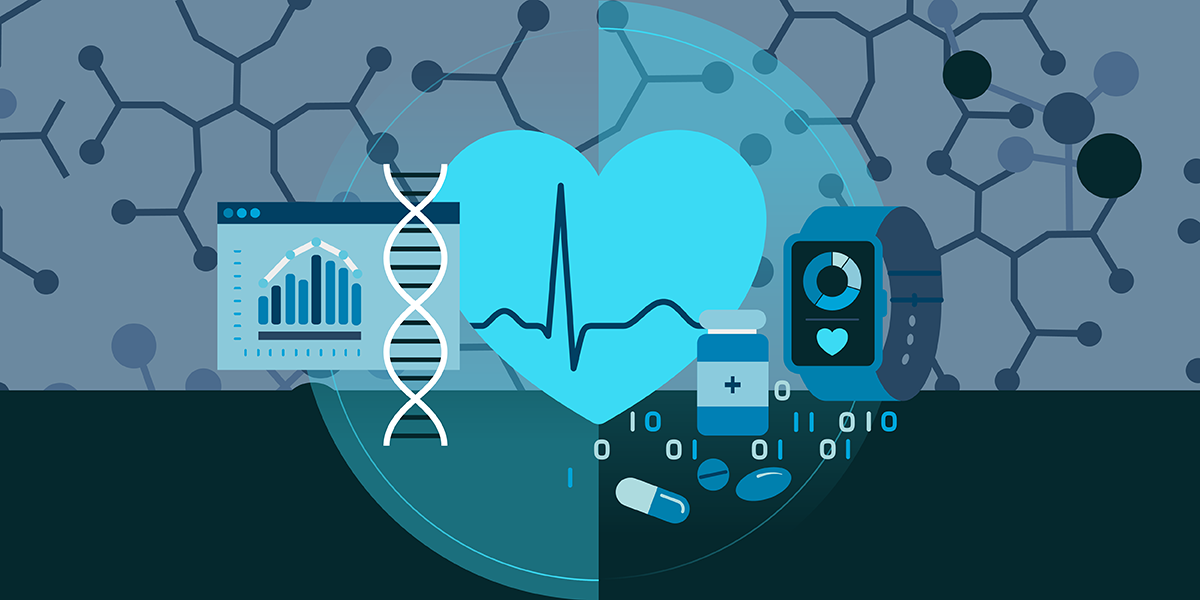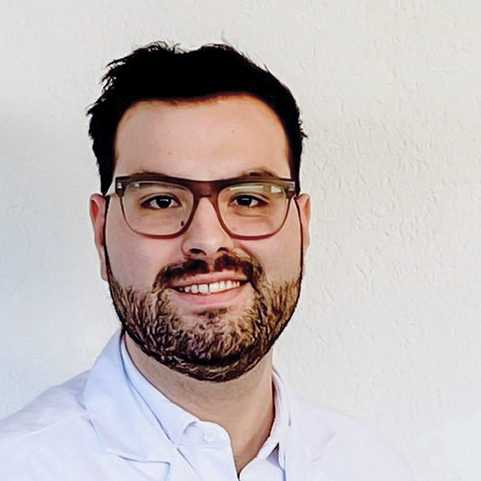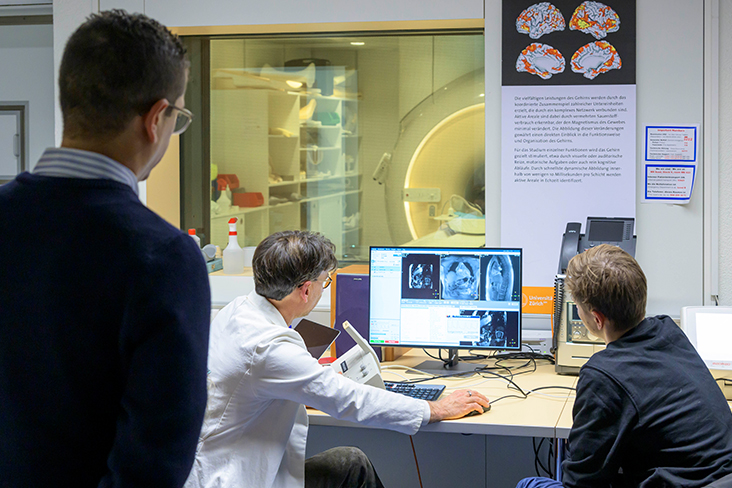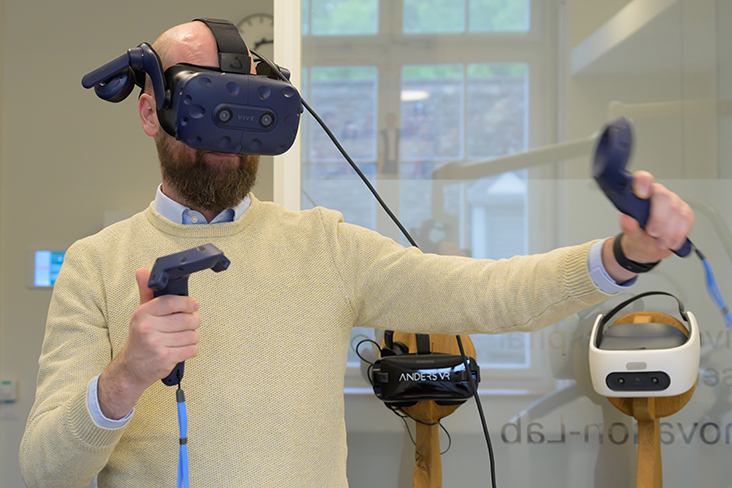CAS ETH in Digital Clinical Trials
In this CAS programme you will learn how to transform a medical research idea into a comprehensive clinical research approach utilising novel digital technologies.

Shaping your clinical research
Clinical research is needed now more than ever to address current medical and societal challenges. Novel technology and innovative approaches may help to address some of these challenges. The use of large amounts of clinical data provides researchers with real-world evidence. Remote patient monitoring via sensors helps generate dense data, and digital biomarkers provide new information for use in clinical practice. Precision medicine offers a greater understanding of diseases and thereby allows practitioners to make more accurate diagnoses and treatment plans. Using these tools requires exact knowledge about the advantages and disadvantages of the different methods, and often requires using specific approaches for study design and data collection. The CAS ETH in Digital Clinical Trials (CAS ETH DCT) has been designed to provide participants with a comprehensive understanding of the field.
This CAS programme is mandatory for participants in the MAS ETH in digital Clinical Research.
Some modules of the CAS ETH DCT can separately be booked (short courses).
Content CAS ETH in Digital Clinical Trials
The course consists of six modules that guide participants through designing a digital clinical study. Participants will use their own or a given clinical research question to learn how modern study concepts, digital measures, precision medicine, AI applications, real-world data and digital health technology are used in the design of a digital study. By the end of the programme, participants will be ready to present a comprehensive study synopsis or project.
All modules include input lectures, remote preparation, and onsite workshops to discuss the participants’ individual approaches.

Participant profile CAS ETH in Digital Clinical Trials
Keep yourself up to date
Do not miss the opportunity to bring your know-how in clinical research to the next level. If you are curious, ambitious and have the background noted below, the CAS ETH in Digital Clinical Trials (CAS ETH DCT) is intended for you.
- Physicians, dentists, veterinarians
- Swiss or international MD, DMD, DDS or DVM
- Residents or specialists
- Healthcare professionals
- Master’s degree or equivalent in life sciences, e.g., human movement sciences, pharmacy/pharmacology, food science
- Representatives from the MedTech industry
- Master’s degree or equivalent in life sciences, e.g., human movement sciences, pharmacy/pharmacology, food science, veterinary medicine
- Mid-level clinical managers
Participants should be involved in clinical research and have between two and ten years of work experience.
CAS ETH DCT applications are reviewed by the Admission Committee of the Certificate Programme. The final decision is communicated to applicants in writing.

“As a medical doctor, I see clinical research as the backbone of the medical sciences. During the CAS I learned about new concepts and the digital tools needed to implement them. This is helping me lead medicine into the future.”José Roshardt, MD, orthopaedic surgery resident
The first module of CAS ETH DCT, «The Power of Study Design», kicks off by putting patients at the forefront – those individuals for whom clinical research is conducted. Over the course of a dynamic three-day block onsite at ETH, participants will have the invaluable opportunity to gain insights directly from patients and will discover the patient's perspective on clinical trials. They will learn how to actively engage them in the research process, and master the art of co-designing studies that are not only impactful but also feasible. Participants will also be introduced to funding of clinical trials and human research ethics, and get introduced to digital biomarkers. They will explore established study designs and elements, as well as modern concepts such as decentralized clinical trials, pragmatic trials, adaptive designs, umbrella or basket studies, case only designs, instrumental variables, and propensity scores. During interactive group work they will apply the learning in designing a study and setting up a study synopsis or basic protocol.
This module of the CAS ETH DCT can be booked as as a separate, contiguous continuing education short course. Swiss doctors who complete only this module will receive 25 credits toward their non-specific continuing education requirements (approved by SIWF).
In this module, participants will learn about new evidence generation methodologies which leverage digital technologies and machine learning to monitor patients during clinical trials. Students will start with an introduction to key background and terminology, and an overview of the entire process for developing novel digital measures. Over several interactive sessions, reinforced by deep dives led by expert guest lecturers, students will then develop their own case studies for a novel digital measure: exploring the application of patient-centric research; best practices for deciding on the right technology; validation of the new measure. Finally, students will pitch their case studies back to the class.
This module will leave students with an understanding of both foundational concepts and practical realities in developing new sources of digital evidence for use in clinical trials.
Module 2 of the CAS ETH DCT can be booked as as a separate continuing education short course course. Swiss doctors who complete only this module will receive 25 credits toward their non-specific continuing education requirements (approved by SIWF).
Precision Medicine is a new approach in health care aiming to deliver personalized prevention and treatment for human diseases by considering individual differences in lifestyle, environment, and biology. As Precision Medicine is a multidisciplinary approach, the content of this course includes topics in genetics, epigenetics, pharmacogenetics, big data interpretation and evaluation of public genomic data. In addition, screening, diagnosis, and therapies for case scenario diseases that apply to Precision Medicine are presented. This course starts with blended learning and remote Q&A sessions. During a 3-day block course onsite at ETH, students will learn about applications of machine learning and AI in pathology, MR imaging, and functional genomics. Furthermore, they will get insights from case studies in precision oncology, and will be introduced to an app designed to facilitate patient-study matching in oncology. The goal of this course is to obtain the knowledge to understand the chances and impact of precision medicine and AI to deliver the right therapy to the right person at the right time with the right dose.
This module provides an overview of the importance of Real-World Data (RWD), different RWD sources, and how RWD can be exploited in healthcare, clinical and personalised health research, as well as in regulatory decision making. It highlights current trends and existing methods for using and analysing RWD. Lastly, the module will address ethical, methodological and regulatory challenges related to the use of RWD in clinical research and health care.
Participants are introduced to the different types and sources of RWD in Switzerland and abroad. Moreover, challenges and chances associated with the use of RWD in terms of standardisation, interoperability, and accessibility will be discussed. Participants are presented with the common ontologies and classifications used for data standardisation, as well as various data models and interoperability approaches used in national and international health data initiatives. The module also addresses the ethical and legal challenges involved in the use of RWD and presents possible solutions. Experts from academic research, private sector work, as well as national and international representatives of RWD collections will discuss various use cases for RWD integration and address the influence on disease definition, outcome prediction, and treatment selection.
In a hands-on workshop, participants will learn to understand the data source contents, characterise/profile the dataset, get to know the benefits of working with data in a database, query the data, and identify data quality issues.
Module 4 of the CAS ETH DCT can be booked as as a separate continuing education short course course. Swiss doctors who complete only this module will receive 25 credits toward their non-specific continuing education requirements (approved by SIWF).
In this module, participants learn how to generate new data types utilising wearables and apps. Input lectures and workshops help participants understand what is needed to integrate sensor technology into remote, decentralized trials. The module starts with a 3-day block course on site where students will work hands-on with sensors, understand associated usability, data privacy, and technological barriers. Furthermore, they see how sensor technology is applied in a hospital. The module involves a discussion of the complete technological chain – from device selection, integration into the trial, data transfer, storage, and analysis. Participants choose the appropriate technology for their individual clinical research question and go through all the necessary steps for technology integration. Experts in the field provide examples to illustrate challenges and solutions for integrating sensor technology in clinical trials. On top of this content, participants will gain insights into health technology assessment and regulatory thinking.
Participants apply the knowledge they have gained during the CAS programme in a clinical study synopsis or investigation plan. Consultations with tutors help participants with study designs, the inclusion of digital measures, statistics, ethics, and key features of the research approach. Participants hand in their synopsis and defend it during the final workshop. This serves as the basis for the certificate. The feedback from tutors and peers helps to further improve participants’ research strategies. After this, they are ready to turn their knowledge into practice.
The primary teaching day for this programme will be Thursday, with some exceptions and breaks during public holidays. Additionally, there will be three 3-day block courses held on-site from Wednesday to Friday at the start of the study in September, and in January and April. Please find a detailed overview of the academic calendar here:
Download Academic calendar: 2025_26 (PDF, 110 KB)
Disclaimer: Dates and format are subject to change.
The programme consists of live sessions (lectures/workshops/group work) on-site and remotely, blended learning, an interactive fair, coaching sessions, and self-study content using a virtual learning environment. Participants are encouraged to allocate dedicated time for self-study, preparations, and other related activities to enhance their learning experience.
Why participate in the CAS ETH in Digital Clinical Trials?
Why you?
This course of study will significantly increase your knowledge of and your chances for a professional career in clinical research. Medical doctors and healthcare professionals will benefit from the know-how taught in the programme, as well as the international expert network it gives them access to for their work in this area. The CAS ETH DCT will enable you to address your individual clinical questions in a systematic way.
Why this course?
The course combines traditional content on clinical trial planning and execution with the potential of novel, digital technologies. Participants learn from experts, based both at ETH and internationally, and are taught how to transform a research idea into a comprehensive and patient-centred clinical research approach utilising wearables and apps. Participants also learn about the processing of real-world data and machine learning.
Why at ETH?
ETH is one of the world's best universities and the best university in continental Europe (Times Higher Education ranking). Become part of ETH and get access to ETH’s world-leading experts in digital medicine, sensor technology, software development, artificial intelligence and digital clinical trials. Through direct interaction with these specialists, participants gain first-hand knowledge of the field. After the course, participants continue to benefit from this access in their clinical research projects.
A lifetime connection with ETH
After having graduated with a Certificate of Advanced Studies (CAS) from ETH you can join the ETH Alumni Association. Stay connected and become inspired! As an ETH alumnus, you will also enjoy various member benefits.
Get in touch and book your personal consultation
Professur Translationale Ern.biol.
Schorenstrasse 16
8603
Schwerzenbach
Switzerland


